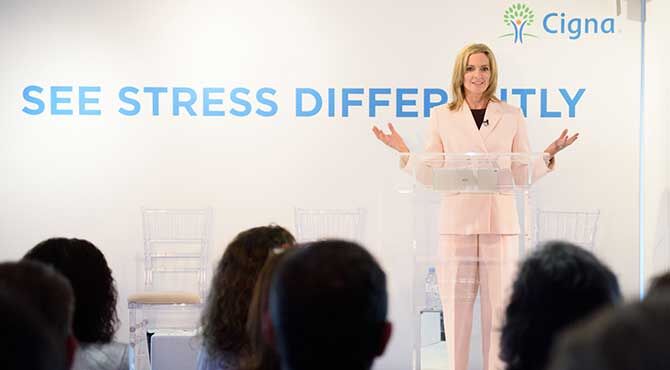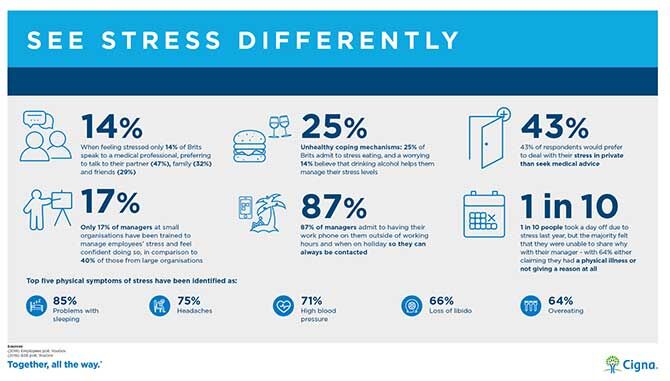Stressed out Britons aren't seeking professional advice
With new research finding that 86% of Britons are reluctant to seek professional help for stress and burnout, Cigna launches its 'See Stress Differently' campaign.

Gabby Logan at the launch of Cigna’s ‘See Stress Differently’ campaign
 24 September 2019
24 September 2019The launch of Cigna’s ‘See Stress Differently’ campaign, with Gabby Logan
Speaking at a lively event held at the OXO Tower on London’s Southbank, to mark the launch of Cigna’s ‘See Stress Differently’ campaign, Gabby Logan, TV presenter, an advocate for health and wellbeing supporting the campaign, called on the audience of HR professionals and employers to encourage their employees to take control.Speaking from personal experience, she said, “Life has definitely got more stressful for me in the past few years, juggling work, family and friends. With a never-ending to-do list of commitments, it can be difficult to take time for myself. This initiative is helping increase awareness around stress so that people recognise that serious chronic illnesses that can be avoided if recognised and diagnosed early. For me, nothing beats a quick 30-minute workout at the end of the day – preferably outside if the weather is okay!”
Technology to visualise stress can help employers and employees

Stress and the healthy workplace: leadership needs to come from the top
Making the invisible visible in this way could be a powerful tool in the workplace, enabling employers to have those conversations around stress, work-life balance and a 24/7 addiction to mobile devices. Undoubtedly employers are key stakeholders in health and wellbeing at work but individuals are also stakeholders and need to take responsibility for their own health and wellbeing too.A panel discussion which included Henrietta de Beer, UN chief of staff HR underlined the importance of the leadership message coming from the top in creating a healthy workplace with a resilient and healthy workforce.Speak to your doctor if you or your employee is experiencing symptoms of stress
It is widely recognised stress affects physical health too, with 62% of respondents recognising the link.When professional medical advice is avoided, lesser-known physical symptoms of stress can often go undiagnosed. This can result in people trying to find cures for the symptoms of chronic stress, rather than addressing the root cause. The symptoms least likely to be recognised as stress-related are:- backache (29%),
- blurred eyesight or sore eyes (33%)
- indigestion or heartburn (46%)
Related articles:
- Employers: working women are stressed and looking for wellness support
- Study takes work-life balance to another dimension
- Safeguarding mental wellbeing for globally mobile employees
Cigna’s annual global 360 Global Well-Being Survey found that 87% of workers feel stressed and 12% feel their stress is unmanageable. This may be a result of an ‘always on’ culture in the workforce. New research reveals that 87% of managers admit to having their work phone on them outside of office hours and when on annual leave, setting an unhealthy precedent for staff.In fact, only one in 10 Britons have taken a sick day off due to stress-related issues in the last year, but felt they were unable to admit the real reason for doing so – with the majority (64%) either claiming they have a physical illness or not giving a reason at all.
The interconnection between mental and physical health
Phil Austin, Cigna Europe CEO, said, “Mental health and physical health – mind and body – are interconnected, taking action so that people and healthcare professionals better understand the link means we can do more, sooner, to help people stay healthy. We can’t hide from the fact that the workplace is a stressful place to be, but what we can do is give managers and employees the tools to manage their stress in a structured and engaging way.“Cigna wants to help the world take control of stress and hopes to reduce stress-related chronic illnesses. By taking a proactive approach to manage stress, we can reduce chronic illnesses, and lead happier, healthier and longer lives and by encouraging people to seek the right advice, we can potentially, save lives as part of our core mission to improve the health, wellbeing and peace of mind of those we serve.”Cigna is on a mission to help people take control of their stress by encouraging them to create a personal Stress Care PLAN. They advise that people find a:- Period of time to unwind: Set aside a designated time each day to slow down and relax
- Location that is stress reducing: Designate a physical place to take a break, whether it’s the gym or a coffee shop
- Activity to enjoy: Choose an activity but make sure it’s easily accessible, practical and affordable
- Name of a person to talk to: Find someone you are comfortable talking to who will offer you support and guidance
For more news and views on employee stress, health and wellbeing, visit our dedicated Global Health and Wellness section.
Subscribe to Relocate Extra, our monthly newsletter, to get all the latest international assignments and global mobility news.Relocate’s new Global Mobility Toolkit provides free information, practical advice and support for HR, global mobility managers and global teams operating overseas. Access hundreds of global services and suppliers in our Online Directory
Access hundreds of global services and suppliers in our Online Directory
©2025 Re:locate magazine, published by Profile Locations, Spray Hill, Hastings Road, Lamberhurst, Kent TN3 8JB. All rights reserved. This publication (or any part thereof) may not be reproduced in any form without the prior written permission of Profile Locations. Profile Locations accepts no liability for the accuracy of the contents or any opinions expressed herein.

































